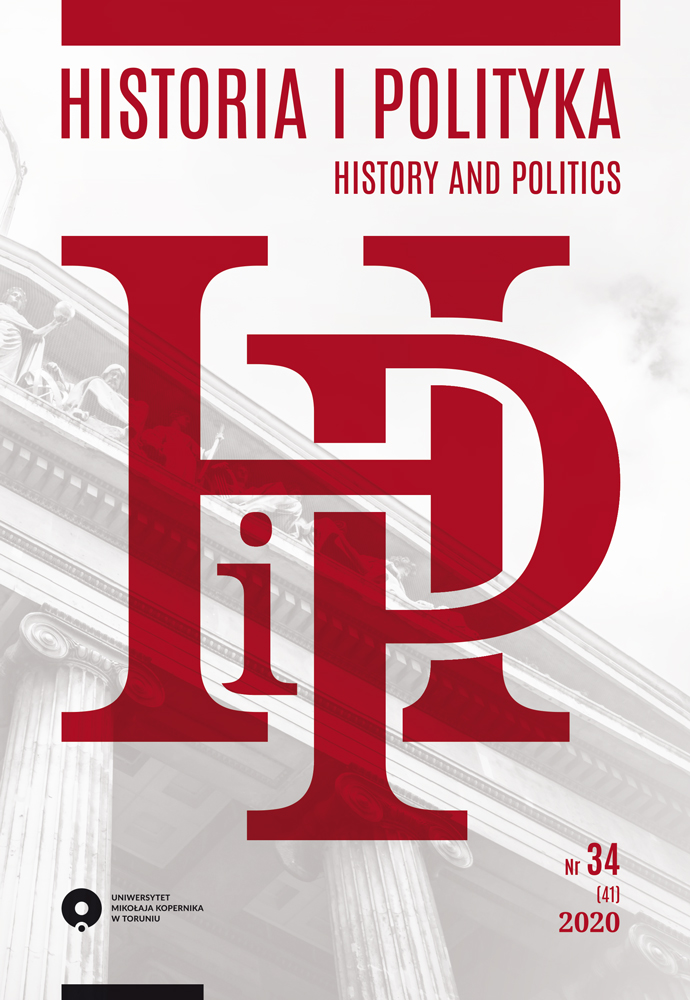Geostrategic Significance of Ukraine in the Region of Central and Eastern Europe in the Works of Dmytro Dontsov and Yurii Lypa
DOI:
https://doi.org/10.12775/HiP.2020.040Słowa kluczowe
Central and Eastern Europe, the Baltic-Black Sea region, geopolitics, Ukrainian state, Russian aggressionAbstrakt
The purpose of this paper is to determine the geostrategic role of Ukraine in Central and Eastern Europe and the Baltic-Black Sea region, its geopolitical potential to become a major integration factor for this macro-region, and its ability to withstand the expansive challenges of Russia in extrapolating the views of Ukrainian thinkers D. Dontsov and Y. Lypa.
After all, the region of Central and Eastern Europe became the base for a large-scale hybrid war. Undoubtedly, Ukraine remains the main target of Russian military and information aggression. However, in contrast with Russian aggression, countries in Central and Eastern Europe have to develop a common consolidated and coordinated position in order to maintain stability and security in this macro-region.
A significant part in the works by Dmytro Dontsov and Yurii Lypa is given to the development of cooperation between the countries of Central-Eastern Europe and the Baltic-Black Sea region to restrain Russia’s aggression. At the same time, Ukrainian thinkers determine the place and the role of the Ukrainian state in the integration of this geopolitical space and its strategic importance in the development of Central and Eastern Europe.
Bibliografia
Bagan, O. (2002). Ukrainian Pontyda: Geopolitical Dimensions of Modern Ukraine. Drohobych: Kolo.
Bagan, O. (2016). Current Nationalistic Theory: Theoretical, Cultural, Geopolitical, Historiosophical Aspects. Lviv: LA “Pyramid”.
Bagan, O. (2018). Crisis of the Intermarium? Or the Geopolitical Crossroads of Central and Eastern Europe. In: T. Boiko, B. Halaiko, & Y. Syrotjuk (eds.). Misija Ukraïny ta nacional’ni interesy v hlobalizovanomu sviti: vizija nacionalistiv [Mission of Ukraine and Its National Interests in the Globalized World: Vision of Nationals] (pp. 210–221). Kyiv–Lviv: Astrolabe.
Brzezinski, Z. (2000). The Grand Chessboard: American Primacy and Its Geostrategic Imperatives. Lviv–Ivano–Frankivsk: Lileia–NV.
Brzezinski, Z. (2006). Ukraine in the Geostrategic Context. Kyiv: K. Ed. House “Kyiv-Mohyla Academy”.
Chuprii, L. (2017). Geopolitical Strategy of the leaders of the Ukrainian Liberation Movement in the Early 20th Century in the Context of Regional Security. Retrieved from: http://publications.lnu.edu.ua/bulletins/index.php/history/article/viewFile/9790/9801.
Demchyshak, R. (2014). Foreign Policy of the State in the Ukrainian Political Thought of Western Ukraine Nationalist Direction of the Twentieth-Century Interwar Period. Retrieved from: http://nbuv.gov.ua/UJRN/Unir_2014_26_5.
Demchyshak, R. (2018). The Eastern Vector of Foreign Policy of Poland: Ideological Foundations and Peculiarities of Implementation at the Present Stage. Gileya, 137, 401–406. Retrieved from: http://irbis-nbuv.gov.ua/cgi-bin/irbis_nbuv/cgiirbis_64.exe?C21COM=2&I21DBN=UJRN&P21DBN=UJRN&IMAGE_FILE_DOWNLOAD=1&Image_file_name=PDF/gileya_2018_137_102.pdf.
Dontsov, D. (1957). The Basis of Our Politics. New York: ODFFU.
Dontsov, D. (2009[1918]). Ukraine’s International Position and Russia. In: O. Bagan (ed.). Ukrainian Nationalism: History and Ideas (pp. 366–387). Drohobych: Posvit.
Kaminskyi, Ye. (2008). The World of Winners and Losers: International Relations and the Ukrainian Perspective at the Beginning of the XXI Century. Kyiv: Vilna Presa Center.
Lypa, Y. (2007). All Ukrainian Trilogy. Vol. 2: Mission of Ukraine; The Black Sea Doctrine; Division of Russia. Kyiv: MAUP.
Lypa, Y. (1999). Geopolitical Landmarks of the New Ukraine. Retrieved from: http://chtyvo.org.ua/authors/Lypa/Heopolitychni_orientyry_novoi_Ukrainy.
Polishchuk, Ya. (2020). The Search for Eastern Europe: The Shadows of the Past, the Mirages of the Future. Chernivtsi: Books – XXI.
Todorov, I. (2016). Geopolitical Project “Intermarium” and Russian Aggression. Geopolitika Ukrainyi, 2(17), 27–40. Retrieved from: https://dspace.uzhnu.edu.ua/jspui/handle/lib/22492.
Vasylevych, Y. (2012). The Black Sea Conception of Yurii Lypa in Geopolitical Thought of Ukraine. Scientific Papers. Political Science, 178(166). Retrieved from: http://politics.chdu.edu.ua/article/view/75501.
Zagrebelnyi, I. (2019). Intermarium: (Almost) Lost Chance. Kyiv: Khalikov R.H.
Pobrania
Opublikowane
Jak cytować
Numer
Dział
Licencja
Uniwersytet Mikołaja Kopernika w Toruniu respektuje prawo do prywatności i ochrony danych osobowych autorów.
Dane autorów nie są wykorzystywane w celach handlowych i marketingowych. Redaktorzy i recenzenci są zobowiązani do zachowania w poufności wszelkich informacji związanych ze złożonymi do redakcji tekstami.
Autor, zgłaszając swój tekst wyraża zgodę na wszystkie warunki i zapisy umowy licencyjnej (określającej prawa autorskie) z Uniwersytetem Mikołaja Kopernika w Toruniu.
Statystyki
Liczba wyświetleń i pobrań: 283
Liczba cytowań: 0



